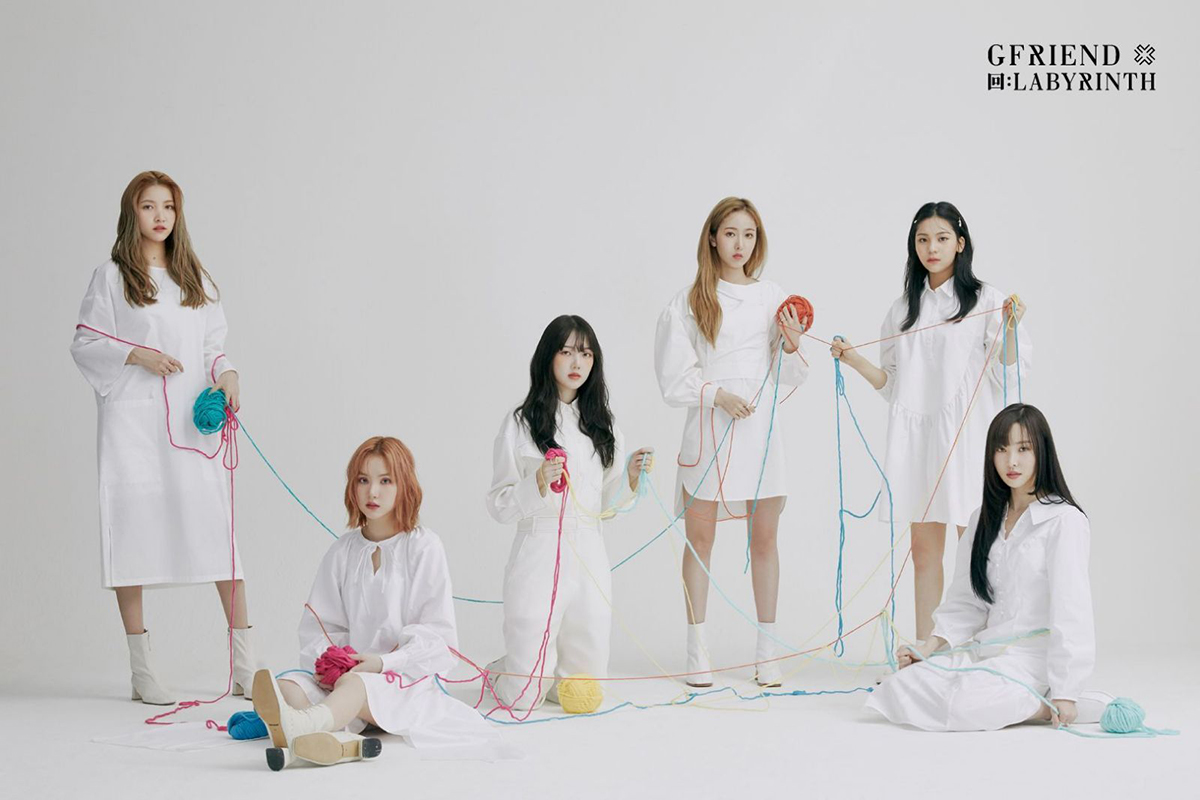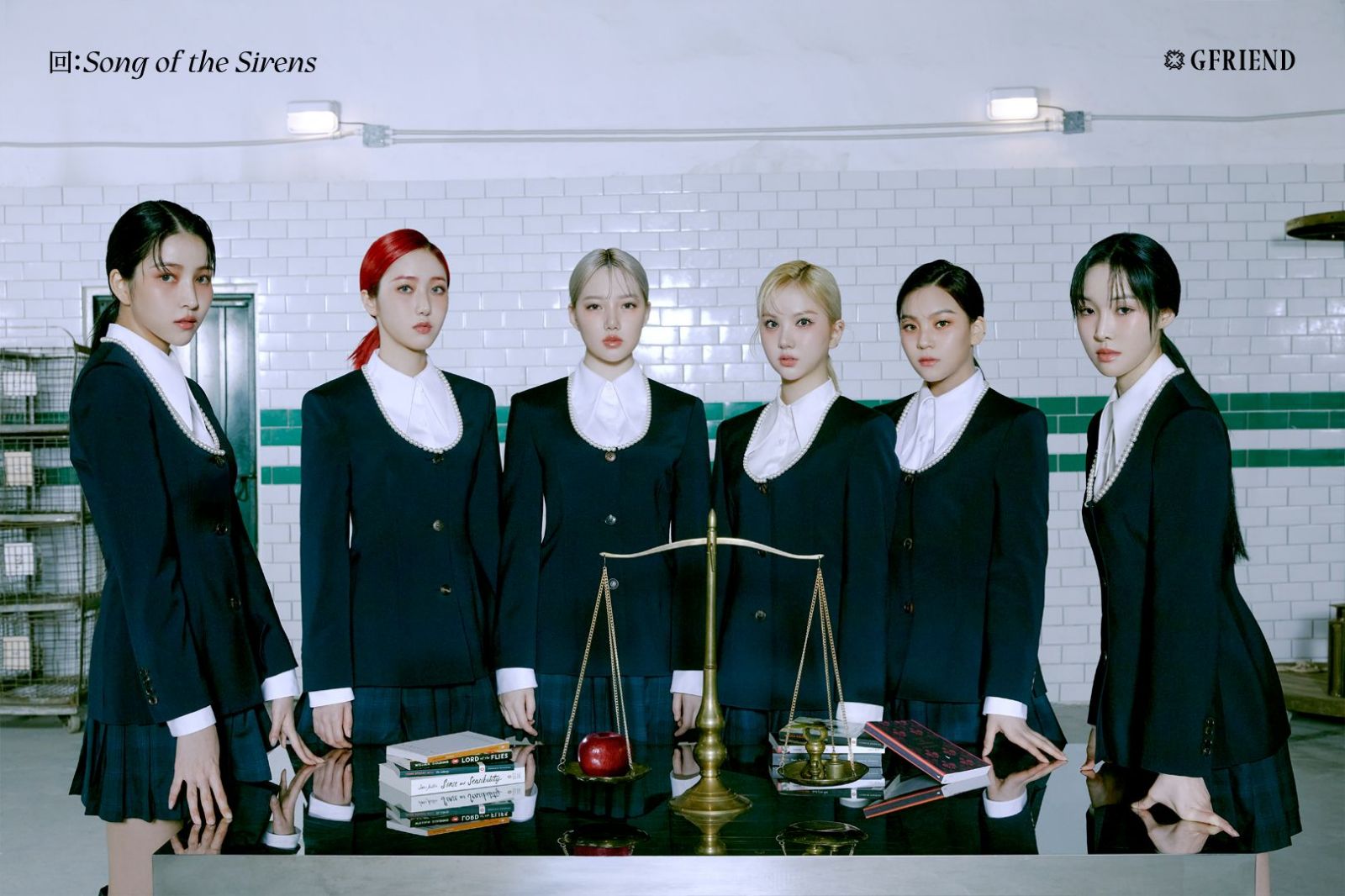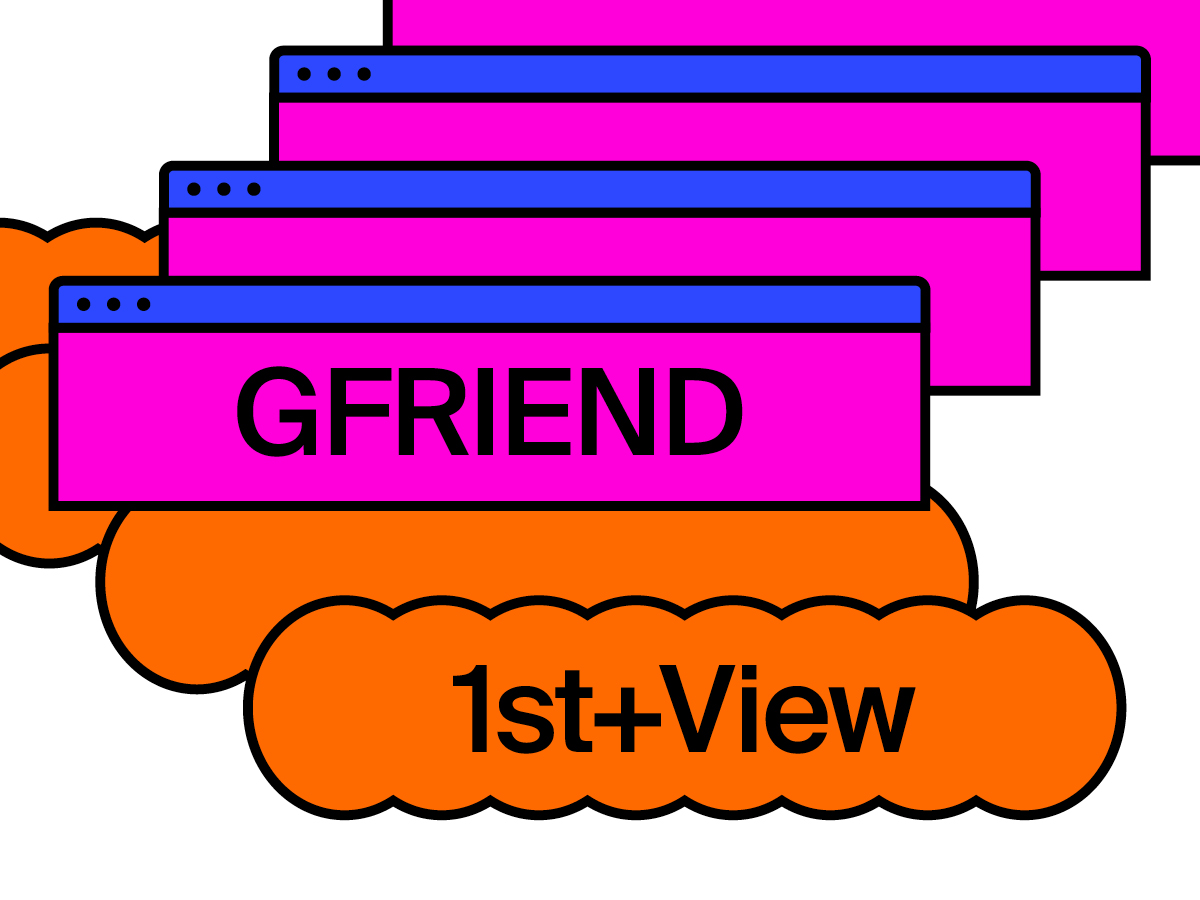
REVIEW
GFRIEND: reinterpreting myth with “回” series
A festival of mythical women, as reimagined by GFRIEND
2020.11.17
GFRIEND have been borrowing women from literature and myth to be the subjects of their “回” series: Ariadne and the Labyrinth from the myth of Theseus; the mythical Siren and Biblical good and evil; Faust’s Walpurgis Night and medieval witches. The first scene of “回” depicts a clock turning backwards against a galactic backdrop, and the final scene closes with a backwards moving train, both of which reveal a desire to return to a time filled with friends and fun. This serves to symbolize a feeling that combines looking back on the past while contemplating choices for the future, and at the same time reversing motifs borrowed from myths and novels.
"回: Labyrinth" recalls the story of Ariadne who, although she plays a decisive role in Theseus’s safe escape from the Labyrinth by handing him the ball of yarn he unravels just outside the entrance, is remembered only as his forgotten lover. Unlike the established myth that focuses on Theseus’s courage, however, the focal points of the album are Ariadne’s thread and the Labyrinth. In “Twisted,” the concept photo for "回: Labyrinth", Ariadne’s thread is there for her, not for Theseus, bundling herself up or interweaving with the others’ threads to enfold their surroundings. Seeing the members with thread in hand gives the impression they’ve each become Ariadne, wandering the Labyrinth. Unlike a maze with its crossroads leading through various possible routes, the Labyrinth has one path which is complexly tangled and difficult to navigate, but escape is possible by going back the way you came in. Therefore, in the B-side “Labyrinth,” GFRIEND are conflicted between whether to stay in a beautiful maze world or to escape from it, and, in case of “Crossroads,” the title song, they wrestle with which way to turn when two sides of the self clash. When GFRIEND sing in “Labyrinth,” “If you want to do it for me, I’m going to the end,” they focus on the inner lives of women, like Ariadne, whose story plays an important role in Theseus’s heroic tale but is often disregarded as a mere afterthought, and instead grant her a narrative. In the GFRIEND version, Ariadne unravels the thread for herself, not for her lover, and wanders through the Labyrinth, placing women who play crucial roles, but had been left anonymous, at the forefront.
"回: Labyrinth" recalls the story of Ariadne who, although she plays a decisive role in Theseus’s safe escape from the Labyrinth by handing him the ball of yarn he unravels just outside the entrance, is remembered only as his forgotten lover. Unlike the established myth that focuses on Theseus’s courage, however, the focal points of the album are Ariadne’s thread and the Labyrinth. In “Twisted,” the concept photo for "回: Labyrinth", Ariadne’s thread is there for her, not for Theseus, bundling herself up or interweaving with the others’ threads to enfold their surroundings. Seeing the members with thread in hand gives the impression they’ve each become Ariadne, wandering the Labyrinth. Unlike a maze with its crossroads leading through various possible routes, the Labyrinth has one path which is complexly tangled and difficult to navigate, but escape is possible by going back the way you came in. Therefore, in the B-side “Labyrinth,” GFRIEND are conflicted between whether to stay in a beautiful maze world or to escape from it, and, in case of “Crossroads,” the title song, they wrestle with which way to turn when two sides of the self clash. When GFRIEND sing in “Labyrinth,” “If you want to do it for me, I’m going to the end,” they focus on the inner lives of women, like Ariadne, whose story plays an important role in Theseus’s heroic tale but is often disregarded as a mere afterthought, and instead grant her a narrative. In the GFRIEND version, Ariadne unravels the thread for herself, not for her lover, and wanders through the Labyrinth, placing women who play crucial roles, but had been left anonymous, at the forefront.
-
 ©️ SOURCE MUSIC
©️ SOURCE MUSIC
Following Labyrinth, the theme of temptation is explored in Song of the Sirens and its title track, “Apple.” Original sin started when, deceived by the words of the serpent, Eve eats the forbidden fruit of the tree of the knowledge of good and evil and offers some to Adam. Unlike the Biblical portrayal of women as merely suffering as a result of temptation, the Siren myth connects women and temptation by portraying them as the temptresses themselves. The Sirens lure passing sailors with their physical beauty and pure song, and the sailors, possessed by song, steer their boat toward the Sirens’ island, only to die in the shipwreck, or else jump into the water to take their own lives. But as GFRIEND member UMJI says, “Apple” is a song that “shows a girl standing before unexpected temptation, wavering. I don’t think the word ‘temptation’ carries an exclusively negative meaning.” And so the dictionary definition of enticing another onto a bad path through innocuous words or actions, and the usual image of temptation in fables, are turned on their head in “Apple” with lyrics like, “Why does that icy decision / Hurt me so? Was it a mistake?” The allusion to a “translucent glass bead glowing red” also connects the current incarnation of GFRIEND to the group’s earliest days and their debut song “Glass Bead.” Even if they can’t be sure the path they’ve chosen is the right one, they know what they want because they ate the forbidden fruit. In the “Tilted” concept photo, significant items from previous music videos, such as a diary, teddy bear, and flowers are placed on one side facing an arrangement of jewelry, money, shoes, etc. These latter items are regarded as negative, materialistic symbols of vanity and extravagance, but the group bravely weighs these two competing desires. Having followed the Siren’s song and finding the forbidden fruit, GFRIEND know what they want, and have themselves become Sirens, captivating audiences with their beauty and their elegant voices. They reject the preexisting symbolism behind temptation and flip it into a positive image.
Walpurgis Night’s title track, “Mago,” summons forth witches and their festival. As portrayed in Goethe’s Faust, Walpurgis Night is an ominous and profane day of overindulgence. When celebrated today, firewood is burned in the place of witches. But unlike in the past, when women accused of being witches were distrusted, GFRIEND’s reinterpretation presents the “modern witch,” through which they reveal women’s ambitions more realistically and in greater detail. In “My Room,” one of the album’s concept photos, the members portray these girls of the past wandering to the end of the Labyrinth to express, unwaveringly, the various themes of self-reliance emphasized throughout the “回” series: women’s material desires (SOWON), aspirations of beauty (YERIN), and the need for self-expression (SINB). This kind of subject matter connects with lyrics from the final track, “Wheel of the Year,” on the “回” series’ latest album: “It felt like I was trapped in a gigantic maze / The me who kept stopping at crossroads / Wandering around,” and, “What’s the answer? Don’t be afraid.” Like this song, with its ending not yet decided and racing toward “the place my heart responds,” awakening the image of a woman who does as she pleases, GFRIEND summons to the present not a wicked woman but the reinterpreted image of independent femininity revealing itself.
Walpurgis Night’s title track, “Mago,” summons forth witches and their festival. As portrayed in Goethe’s Faust, Walpurgis Night is an ominous and profane day of overindulgence. When celebrated today, firewood is burned in the place of witches. But unlike in the past, when women accused of being witches were distrusted, GFRIEND’s reinterpretation presents the “modern witch,” through which they reveal women’s ambitions more realistically and in greater detail. In “My Room,” one of the album’s concept photos, the members portray these girls of the past wandering to the end of the Labyrinth to express, unwaveringly, the various themes of self-reliance emphasized throughout the “回” series: women’s material desires (SOWON), aspirations of beauty (YERIN), and the need for self-expression (SINB). This kind of subject matter connects with lyrics from the final track, “Wheel of the Year,” on the “回” series’ latest album: “It felt like I was trapped in a gigantic maze / The me who kept stopping at crossroads / Wandering around,” and, “What’s the answer? Don’t be afraid.” Like this song, with its ending not yet decided and racing toward “the place my heart responds,” awakening the image of a woman who does as she pleases, GFRIEND summons to the present not a wicked woman but the reinterpreted image of independent femininity revealing itself.
Before embarking on the “回” series, GFRIEND hinted at their growth through their shifting views on love: “Protect me always, so I won’t break,” they sang on “Glass Bead”; the reason they wanted to “run through time and become an adult” was for you (“Rough”), since “I [was] still just a shy girl” (“Navillera”). They sound serious as they sing “[I’ll] control your heart” in “Fingertip,” and, “Looking at you / Even in an uncertain future / It’s getting a little closer” in “Sunrise,” as if to say “you are my everything” to their love. The growth and change in GFRIEND’s lyrics were once centered around loved ones—friends, lovers, etc.—but their focus shifts little by little to the self as the “回” series unfolds. While “Crossroads” moves its focus slightly to the “I” who struggles to make a decision at one such intersection, there remains a feeling of being lost because “everything is still filled with you”; whereas in “Labyrinth,” the point of view pivots to the self: “If you want to do it for me, I’m going to the end.” Even more striking is the change in lyrics from the first half of “From Me” to the end: “from me to you” becomes “from I to me.” Five years after their debut, GFRIEND, seemingly destined to evolve, choose not to “go back” (the meaning of “回”) and instead grow by changing their theme from “love you” to “love yourself,” delivering a message of self-reliance to women by asking them to redirect their love inward. This can be seen as well in “My Girls,” the concept photo for Walpurgis Night. Picture frames bearing words like “adorable,” “tomboy,” and “emotional,” chosen by the group members themselves, are all words that have been used to contain women and GFRIEND, but are here their own personally selected evaluations and not the judgment of others. Now GFRIEND, after having faced uncertain decisions (“Labyrinth”), and spent time wandering about and wavering from temptation (“Song of the Sirens”), have finally reached the Walpurgis Night festival, sure of what it is they want to do.
Through themes of jealousy and conflict, uncertainty, and women’s desires and self-reliance, the “回” series escapes the confines of “woman as lover” and paints an image of women as multifaceted and three-dimensional. In “Tarot Cards,” they wish someone else would make decisions for them but finally “find [their] own answer,” and the lyrics to “Three of Cups” form with it a pair, to “Share trivial jokes / And serious worries / And it suddenly spills out / Our brightest ever, light this night.”
Through themes of jealousy and conflict, uncertainty, and women’s desires and self-reliance, the “回” series escapes the confines of “woman as lover” and paints an image of women as multifaceted and three-dimensional. In “Tarot Cards,” they wish someone else would make decisions for them but finally “find [their] own answer,” and the lyrics to “Three of Cups” form with it a pair, to “Share trivial jokes / And serious worries / And it suddenly spills out / Our brightest ever, light this night.”
Twisting the classics, GFRIEND establishes affirmation through double negation by denying negative words. It recalls the line spoken by the character Ko Moon-young (portrayed by Seo Ye-ji) on the tvN series It’s Okay to Not Be Okay: “I want to be a beautiful witch.” Today, phrases like “playful witch” and “modern witch,” with words that could not have coexisted before, have started to appear. With the “回” series, women throughout history are brought back by GFRIEND through a mythical motif and reinterpreted in a way only GFRIEND can: A nameless woman disappears, only to become a modern witch and find her own way, accepts her desires without guilt, and, despite facing a negative world, puts on a festival. Now that the fireworks are here and the witches’ festival is back, let’s dance for ourselves. Your GFRIEND will be there right next to you.
Article. Minji Oh
Photo Credit. SOURCE MUSIC
Copyright © Weverse Magazine. All rights reserved.
Unauthorized reproduction and distribution prohibited.
Unauthorized reproduction and distribution prohibited.
Read More
- GFRIEND’s New Album, Checklist?2020.11.10
